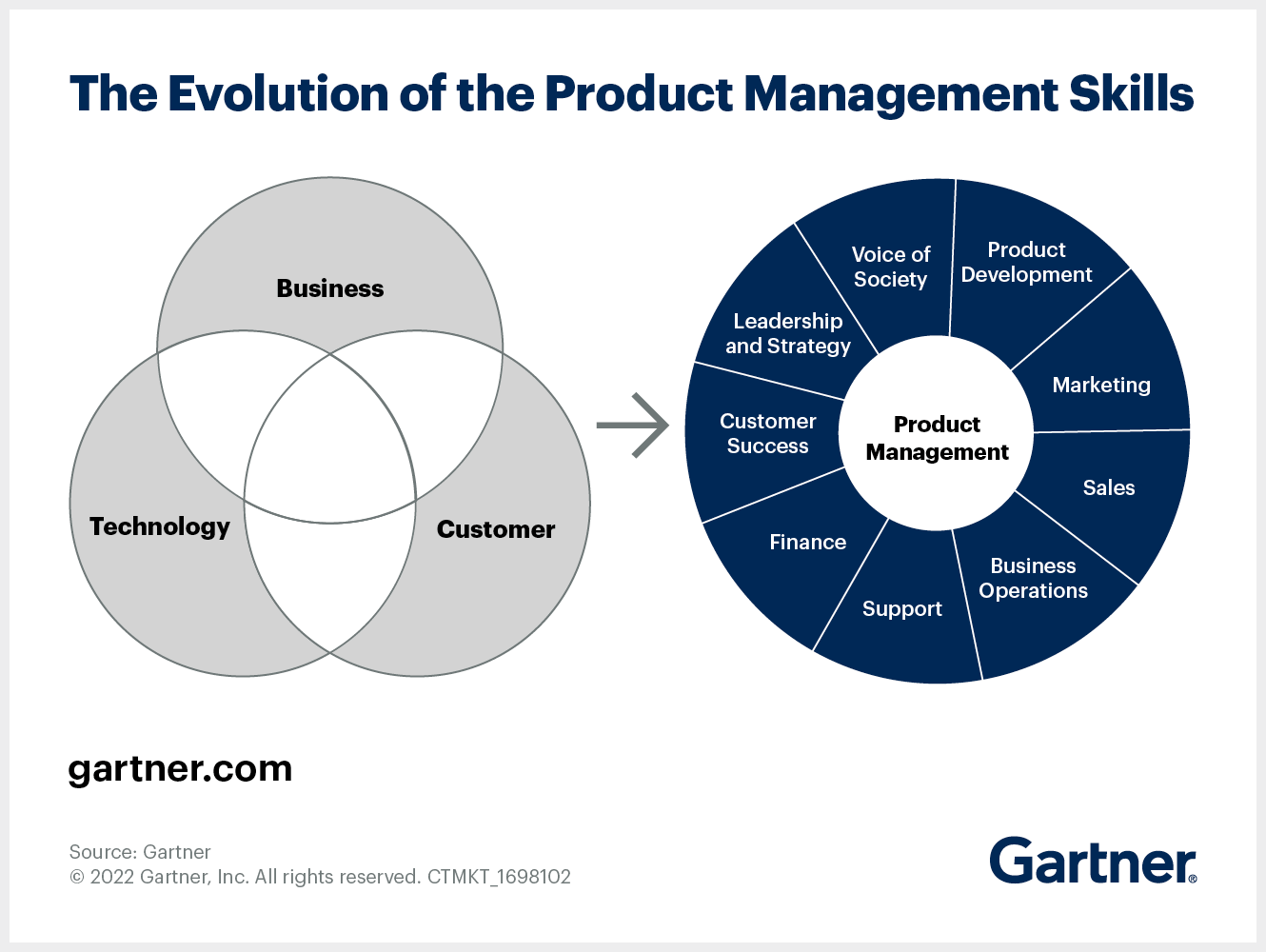14 March 2022
- Gartner client? Log in for personalized search results.
How to Future-Proof Your Product Management Skills
Contributor: Robert Snow
To remain a high-performing asset in the future, product managers must expand their functional skills by relinquishing the traditional practices and adopting a broader perspective.
In short:
- The role of a product manager has undergone massive changes over the past decade. Product management teams must adapt to changing dynamics and acquire new skills.
- As product teams become more data-informed, customer-centric and outcome-oriented, product managers need to focus more on leadership, planning and data analysis, apart from the tactical delivery of features and capabilities.
- To increase their relevance, product teams should develop their skills around a whole-product view of customer experience and business outcomes rather than internal business outputs.
Faced with new tools, capabilities and a deeper focus on customer outcomes over business outputs, the role of a product manager has significantly evolved, but it needs to evolve further.
Historically, organisations valued technical and execution-oriented skills in product management roles and positioned product managers as responsible for the interests of engineering and development teams. While technical skills to perform tactical delivery of features and capabilities remain necessary, there is an emerging need for more leadership, planning and data analysis skills, along with a more nuanced understanding of business operations.
Download now: How Technology Product Leaders Can Drive Revenue Growth
“The evolution of product management skills challenges the traditional Venn diagram of customer, technology and business, and supports a much broader, more specific, cross-domain view of the types of skills that product managers need to demonstrate in their work,” says Clifton Gilley, Senior Director Analyst at Gartner.
The top soft and hard skills for product managers
We see these interpersonal and technical skills growing in relevance as we move towards 2025:
- Storytelling. Help lead both internal and external audiences from idea to value.
- Empathy. Have a deep understanding of the motivations of customers and stakeholders.
- Whole-product experience. Understand the entire customer journey, from initial discovery, to purchasing and implementation, and all the way to retirement.
- Strategic alignment. Take a more active ownership role in product strategy and enable better alignment across an organisation’s product portfolio and higher-level business strategy.
- Data insights. This requires not just an understanding of how to collect and mine data, but also deriving insights through tooling and data science to provide more compelling storytelling.
- Discovery and validation. Enable deeper engagement with the market and customers to uncover pertinent problems and determine proposed solutions.
- Customer value projection. Use data to focus on customer outcomes and lifetime value, and provide a perspective on how your company engages with its market.
- Outcome ownership. Shift from focussing on internal, business-derived outputs to truly owning customer outcomes.
How product management is changing—and will change more
The product manager of 2025 will look very different from the product manager of 2020. Your role will become more focussed on outcomes and strategic planning, and skills such as storytelling, empathy and strategic alignment will become keys to success, more so than tactical considerations that may fall to product owner or product operations roles. There will be a greater emphasis on bringing the “voice of the customer” and an “outside-in” perspective to the business, and product management will become a role largely rooted in customer data analytics and insights.
Organisations need to re-imagine the skills, talents, role definitions and team structures that separate exceptional product managers from the pack. Far too many organisations use a simple seniority-based career progression, rather than one based on the development of new skills or expansion of authority within the organisation. The latter approach is advantageous because it gives a complete picture of the skills required to improve the hiring process and team composition. With this, organisations can restructure the product management team to include more specialists with a specific set of skills rather than generalists who attempt to do everything.
To ensure product managers gain or maintain an edge, product management teams, moving towards 2025, should:
- Identify personal and intra-team skills gaps, and make plans to fill those gaps through specialisation, training or new hires
- Eliminate seniority-based career progression, focussing instead on the breadth and depth of skills that individuals bring to the team
- Push for greater ownership of product strategy and a whole-product perspective—the when, where and how of customers deriving value from their product experiences
Experience Gartner Conferences
Join your peers for the unveiling of the latest insights at the Gartner conferences.
Recommended resources for Gartner clients*:
Future-Proof Your Product Management Skills
Product Management Must Take Back the Role of Product Owner
Create a Product Operations Role to Improve the Strategic Focus of Product Managers
*Note that some documents may not be available to all Gartner clients.
